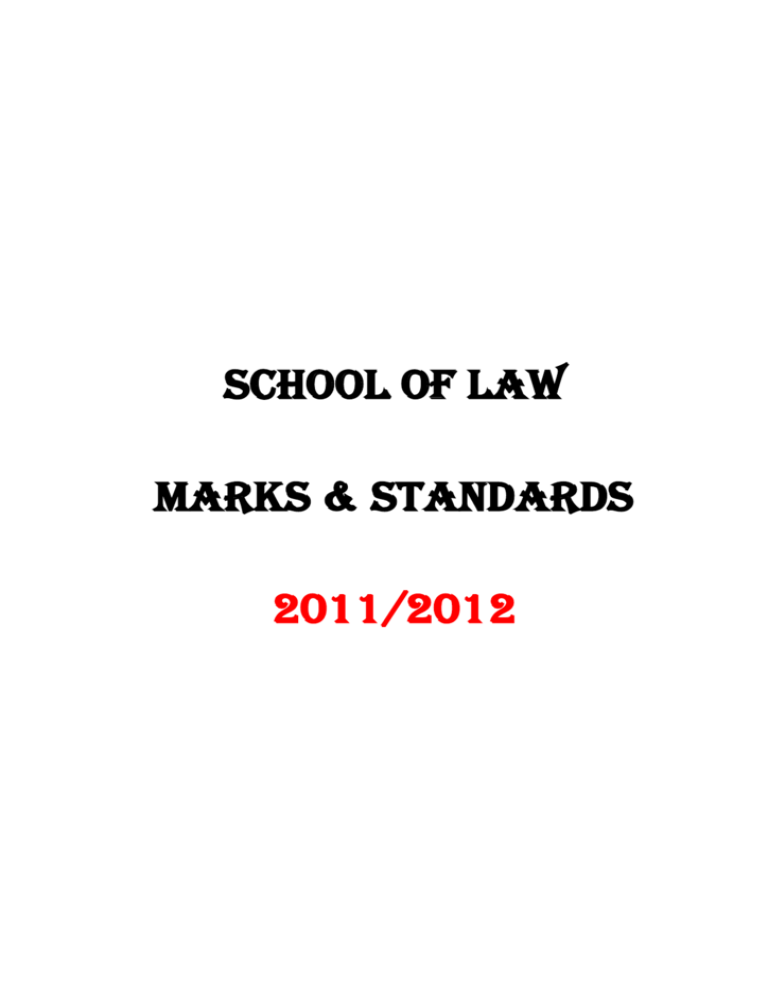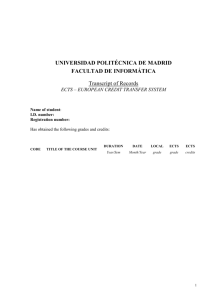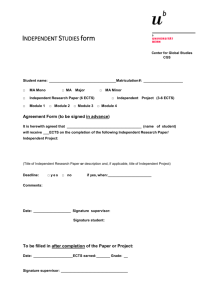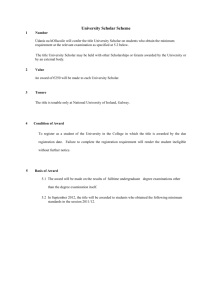first corporate law examination
advertisement

SCHOOL of law MARKS & STANDARDS 2011/2012 GENERAL REGULATIONS (1) In general, up to 25% of the marks in a subject may be awarded for mooting exercises, essays or other work completed during the year. However, in respect of Commerce subjects in the Bachelor of Corporate Law programme, up to 50% of the marks may be allotted to continuous assessment. In the subject Jurisprudence up to 100% of the marks may be so allotted. (2) Oral examinations may be held at the discretion of the Examiners in any subject at any examination for the degree of LL.B. (3) In respect of Commerce subjects available in the Bachelor of Corporate Law programme, a minimum of 35% is required in the written examination before marks for year’s work may be included in the overall mark for the particular subject/module. BACHELOR OF CORPORATE LAW (B.CORP.) FIRST CORPORATE LAW EXAMINATION 1. The subjects and credit weightings are as set out in the College Calendar. 2. First Semester courses may be examined at the Semester 1 examination session. Legal Methods and Research is examined by means of regular assignments and an essay. 3. In order to proceed to Second Year students must accumulate 60 ECTS. 4. Standards: First Class Honours: Second Class Honours Grade 1: Second Class Honours Grade 2: Pass: 70% 60% 50% 40% in each subject. Honours are awarded in individual subjects and at the Summer examination session. Compensation: Compensation may be allowed in subjects to a total of 20 ECTS at a mark(s) of not less than 35%, provided the candidate has excess marks above the pass standard in the other subjects equivalent to double the deficiency. Compensation may be allowed in subjects to a total of 10 ECTS at 35%. Compensation to be possible at the first sitting and the Autumn resit, and thereafter only where exemptions have not been brought to the examination. Exemptions: In the case of candidates who fail in the examination as a whole, credit units for individual components will be awarded where the pass mark has been achieved. EXAMINATIONS OF THE SECOND AND FINAL YEARS CORPORATE LAW 1. In order to be eligible for the award of the B.Corp.Law degree candidates must accumulate a minimum of 60 ECTS in Second Year and 60 ECTS in Final Year. This includes credits for all courses which are deemed obligatory. 2. The credit requirement for graduation may be met in part either by work in the University, or in other universities or law schools for which credit is given by the School of Law, or by a combination of the two, and regardless of whether a subject is described as obligatory or optional. This regulation applies to student exchange programmes approved by the School of Law. 3. Students must accumulate a minimum total of 60 ECTS within two academic years of having passed the First Year Examination. The 60 ECTS must include the obligatory courses specified for the Second Year. 4. Repeat Examinations in the courses of the first and second semesters of the Second and Final Years will be held in the Autumn Examination Session. 5. A student will normally be examined at the end of each semester in the courses completed in that semester. Some courses may extend over two semesters and may be examined at the end of the second semester only. 6. Essay Requirement (a) Students in Second Corporate Law shall be required to submit one essay of 5,000 words on the conditions to be notified by the Law School Office. This essay is a stand alone component which must be passed in order for the examination as a whole to be passed. It is valued at five ECTS. (b) Students in Final Corporate Law shall be required to submit one essay of 2,500 words on the conditions to be notified by the Law School office. The essay shall count for up to 20% of the marks obtained in the subject or module within which the essay is submitted 7. Honours are awarded at the end of the Final Year on the performance of candidates in the examinations of the Final Year or, if it is to the student's advantage, on the results of the Second Year and Final Year Examinations combined. 8. Honours are calculated on the best marks in subjects to a total of 60 ECTS in Second Year and 60 ECTS in Final Year. 9. Honours are awarded in accordance with the following standard: First Class Honours, an aggregate of (about) 70%; Second Class Honours Grade I, an aggregate of (about) 60%; Second Class Honours Grade II, an aggregate of (about) 50%; The Pass mark is 40% in each subject. 10. Compensation: Students may compensate in subjects to a total of ten ECTS in Second Year and ten ECTS in Final Year; the compensatory pass shall be effective at a mark of 35% in the ten ECTS in question regardless both of excess marks in other subjects and whether or not subjects need to be repeated. In cases where more than 10 ECTS have been failed at 35% or above, the student must choose which subject(s) to repeat. 11. To proceed from Second Year to Final Year a candidate must have obtained the 60 ECTS specified for Second Year. 12. The Examination Board Meeting to consider both Semester 1 and 2 results will be held in Summer. B.CORP. LAW (INTERNATIONAL) 1. The B.Corp. Law International is a four-year version of the existing B.Corp. Law programme involving a one-year period of study at an approved university or third level institution outside the state. 2. The International stream is optional. The students selected would spend third year abroad and on the successful completion of this year would take final B.Corp. Law in their fourth year. 3. In order for students to be admitted to Fourth Year they must have achieved an overall result of Pass in Third Year (year abroad) and must have accumulated the 60 credits specified for Second Corporate Law. 4. The Marks and Standards for the ordinary B.Corp. Law shall apply except that the year abroad will operate on a pass/fail basis; honours will be determined on the results of Fourth Year alone or on a combination of Second and Fourth Years, whichever would be to the advantage of the student. 5. Students may compensate in subjects to a total of 10 ECTS credits in Fourth Year; the compensatory pass shall be effective at a mark of 35%. Where more than 10 ECTS have been failed at 35% or above the student must choose which subject(s) to repeat. 6. The number and level of subjects to be taken at the host university must be determined in consultation with the Head of the School of Law, NUI, Galway. 7. To graduate with the B.Corp. International, students in Fourth Year must accumulate a minimum total of 60 ECTS Credits including the 25 credits specified as obligatory. BACHELOR OF CIVIL LAW (B.C.L.) REGULATIONS FOR FIRST B.C.L. 1. The subjects and credit weightings are as set out in the College Calendar. 2. First Semester courses may be examined at the Semester 1 examination session. Intensive Legal Methods and Research is examined by means of regular assignments and an essay. 3. In order to proceed to Second Year students must accumulate 60 ECTS. 4. Standards: First Class Honours: Second Class Honours Grade 1: Second Class Honours Grade 2: Pass: 70% 60% 50% 40% in each subject. Honours are awarded in individual subjects and at the Summer examination session. Compensation: Compensation may be allowed in subjects to a total of 10 ECTS at a mark(s) of not less than 35%, provided the candidate has excess marks above the pass standard in the other subjects equivalent to double the deficiency. Compensation may be allowed in subjects to a total of 10 ECTS at 35%. Compensation to be possible at the first sitting and the Autumn resit, and thereafter only where exemptions have not been brought to the examination. Exemptions: In the case of candidates who fail in the examination as a whole, credit units for individual components will be awarded where the pass mark has been achieved. REGULATIONS FOR SECOND AND FINAL B.C.L. 1. In order to be eligible for the award of the B.C.L. degree candidates must successfully accumulate a minimum of 60 ECTS in Second Year and 60 ECTS in Final Year. This includes credits for all courses which are deemed obligatory. 2. Students who participate in approved Exchange Schemes shall be given credit for subjects taken and examinations passed at the foreign university. 3. Students must accumulate a minimum total of 60 ECTS within two academic years of having passed the First Year Examination. The 60 units must include the obligatory courses specified for the Second Year. 4. Students shall be required to submit one essay of 5,000 words in both the Second and Final Years on the conditions to be notified by the Law School Office. This essay is a stand alone component which must be passed in order for the examination as a whole to be passed. It is valued at five ECTS. 5. Repeat Examinations in the courses of the first and second semesters of the Second and Final Years will be held at the Autumn Examination Session. 6. Honours are awarded at the end of the Final Year on the performance of candidates in the examinations of the Final Year or, if it is to the student's advantage, on the results of the Second Year and Final Year Examinations combined. 7. In the event that excess courses are presented for examination, the best scores to a total of 60 ECTS in Second Year and 60 ECTS in Final Year will be counted for honours purposes. 8. Honours are awarded in accordance with the following standard: First Class Honours, an aggregate of (about) 70%; Second Class Honours Grade I, an aggregate of (about) 60%; Second Class Honours Grade II, an aggregate of (about) 50%. The Pass mark is 40% in each subject. 9. Compensation: Students may compensate up to a total of 10 ECTS units in Second Year and 10 ECTS in Final Year; the compensatory pass shall be effective at a mark of 35% in the 10 ECTS in question regardless both of excess marks in other subjects and whether or not subjects need to be repeated. In cases where more than 10 ECTS have been failed at 35% or above, the student may choose which subject(s) to repeat. 10. To proceed from Second Year to Final Year a candidate must have obtained the 60 ECTS specified for Second Year. 11. The Examination Board Meetings to consider both Semester 1 and 2 results will be held in Summer. BACHELOR OF CIVIL LAW (INTERNATIONAL) 1. The B.Civil. Law International is a four-year version of the existing B.Civil Law programme involving a one-year period of study at an approved university or third level institution outside the state. 2. The International stream is optional. The students selected would spend third year abroad and on the successful completion of this year would take final B.Civil. Law in their fourth year. 3. In order for students to be admitted to Fourth Year they must have achieved an overall result of Pass in Third Year (year abroad) and must have accumulated the 60 credits specified for Second Civil Law. 4. The Marks and Standards for the ordinary B.Civil. Law shall apply except that the year abroad will operate on a pass/fail basis; honours will be determined on the results of Fourth Year alone or on a combination of Second and Fourth Years, whichever would be to the advantage of the student. 5. Students may compensate in subjects to a total of 10 ECTS credits in Fourth Year; the compensatory pass shall be effective at a mark of 35%. Where more than 10 ECTS have been failed at 35% or above the student must choose which subject(s) to repeat. 6. The number and level of subjects to be taken at the host university must be determined in consultation with the Head of the School of Law, NUI, Galway. 7. To graduate with the B.Civil Law International, students in Fourth Year must accumulate a minimum total of 60 ECTS Credits including the 25 credits specified as obligatory. BACHELOR OF LAWS (LL.B.) FIRST LL.B. 1. The subjects and credit weightings are as set out in the University Calendar. A semester course attracts 6 ECTS; a year-long course attracts 12 ECTS. 2. First Semester courses may be examined at the Semester I examination session. 3. In order to proceed to Second Year students must accumulate 48 ECTS. 4. Standards: First Class Honours: Second Class Honours Grade 1: Second Class Honours Grade 2: Pass: 70% 60% 50% 40% in each subject Honours are awarded in individual subjects and at the Summer examination session. Compensation: Compensation may be allowed in each year of the LL.B. in subject(s) to a total of 12 ECTS at a mark(s) of not less than 35% , provided the candidate has excess marks above the pass standard in the other subjects equivalent to double the deficiency. Compensation to be possible at the first sitting and the Autumn resit, and thereafter, only where exemptions have not been brought to the examination. Exemptions: In the case of candidates who fail in the examination as a whole, ECTS credits for individual components will be awarded where the pass mark has been achieved. THE LL.B. EXAMINATIONS OTHER THAN FIRST YEAR (THREE-YEAR MODE) The subjects available are as set out in the Calendar. Credit units are assigned to courses such that a full course is valued at 12 ECTS and a semester course is 6 ECTS; the essay has a value of 6 ECTS. Students must obtain the units assigned to the essay component in both Second Year and Third Year. Standards: First Class Honours: Second Class Honours Grade 1: Second Class Honours Grade 2: Pass: (about) 70% (about) 60% (about) 50% 40% in each subject and essay To be eligible for the award of the LL.B. (full-time mode) candidates must satisfy the conditions as set out at (a) and (b) following: (a) In Second LL.B 54 ECTS (including essay) must be taken and passed. (b) In Third LL.B 66 ECTS (including essay) must be taken and passed. Honours are calculated on the basis of Third Year alone or on the average of Second and Third years combined on a 50/50 basis whichever is to the student’s advantage. If students take more than 54 ECTS in 2 nd LL.B. or more than 66 ECTS in 3 rd LL.B the lowest score for the year in question will be discarded in the calculation of the overall percentage for that year. Candidates who are exempted from First Year and Second Year Law Courses and Examinations (full-time mode) must accumulate a minimum of 66 ECTS (including the essay). In the event that courses in excess of the graduation requirement are presented for examination, the best scores to a total of 66 ECTS will be counted for honours purposes. Compensation: Compensation may be allowed in each year of the LL.B. in subjects/modules amounting to 12 ECTS at not less than 35% provided the candidate has excess marks above the pass standard in the other subjects equivalent to double the deficiency. Compensation to be possible at the first sitting and the Autumn resit, and thereafter, only where exemptions have not been brought to the examination. Exemptions: In the case of candidates who fail in the examination as a whole credit units for individual components will be awarded where the pass mark is achieved. Repeats: The maximum mark obtainable on repeat at the Autumn session will be 49% unless the Board of Examiners recommends otherwise. Such a maximum will also apply in the case of candidates bringing exemptions in certain subjects to the examination. Fail candidates transferring to "4-Year" Mode: A candidate enrolled for First LL.B. Full Time Mode whose status remains as "fail" at the Autumn Examination session may on application to the School of Law transfer to the Second Year of the parttime Mode provided that he/she is deficient in subjects to a total of not more than 12 ECTS. Essay Requirement for Exchange Students: Students who participate in approved Exchange Schemes, whether for a semester or a year, are exempted from the essay requirement for the Academic Session in question. However, such students must make up the six credits by taking a module in substitution. LL.B. PART-TIME, FOUR-YEAR MODE The LL.B. may be taken on a part-time basis over four years. The subject arrangement to be as follows, the figures indicating year-long equivalent subjects; two semester courses equal one year-long course. First Year: Second Year: Third Year: Fourth Year: 3 Year-Long equivalent subjects or 36 ECTS 3 Year-Long equivalent subjects or 36 ECTS 3 Year-Long equivalent subjects and essay 42 ECTS 4 Year-Long equivalent subjects and essay 54 ECTS The Standards as set out above for the full-time mode shall apply except for the following specific requirements: (a) in order to progress from one year to the following year students must accumulate the specified number of ECTS for the year in question; (b) to be eligible for the award of the LLB degree, candidates must, on passing Second Year, satisfy the conditions as set out at (c) and (d) below (c) in Third Year LL.B. 42 ECTS (including essay) must be taken and passed; (d) in Fourth Year LL.B. 54 ECTS (including essay) must be taken and passed. Honours are calculated on the basis of Fourth Year alone or, on the average of the overall percentage result achieved in Third and in Fourth Year. In the event that courses in excess of graduation requirement are presented for examination, the best scores to a total of 42 ECTS in Third Year will be taken into account to calculate the Third Year overall result, while in Fourth Year the best scores to a total of 54 ECTS will be taken into account to calculate the Fourth Year overall result. DEGREE OF LL.M. DEGREE OF LL.M. BY RESEARCH The following shall be the standards for the award of the degree of LL.M. First Class Honours Second Class Honours, Grade I Second Class Honours Grade 2 Pass (about) 70% (about) 60% (about) 50% 40% This mode of LL.M. is awarded only upon the presentation of a thesis. DEGREE OF MASTER OF LAWS IN INTERNATIONAL HUMAN RIGHTS (LL.M.) 1. In order to be eligible for the award of the LL.M. degree, a candidate must present a dissertation of 20,000 to 25,000 words (30 ECTS), take the Introduction to International Human Rights Law course (15 ECTS) and complete additional course modules from the list of courses offered to a minimum total of 45 ECTS so as to accumulate a minimum of 90 ECTS overall. 2. In the event that courses in excess of the graduation requirement of 90 ECTS are presented for examination, the best scores will be counted for honours purposes. 3. Courses may be examined entirely by means of written assignments. 4. All subjects must be passed individually. Compensation is not allowed. A candidate who fails a single subject may, at the discretion of the School of Law, represent in that subject. 5. Candidates who are registered to take the programme on a part-time basis shall in first year present for the course in Introduction to International Human Rights Law (15 ECTS) and further course(s) to a minimum of 15 ECTS amounting to 30 ECTS in total for the year. In the Second Year courses to a total of 30 ECTS must be taken and the dissertation (30 ECTS) presented. 6. Honours are awarded in accordance with the following standards: First Class Honours, an aggregate of (about) 70%; Second Class Honours, Grade I, an aggregate of (about) 60%; Second Class Honours, Grade II, an aggregate of (about) 50%. A pass is 40%. For part-time students honours are calculated on the average of the overall percentage result achieved in First year on 30 ECTS (33.3% of overall) and in Second year on 60 ECTS (66.7% of overall). DEGREE OF MASTER OF LAWS IN PEACE OPERATIONS, HUMANITARIAN LAW AND CONFLICT (LL.M.) 1. In order to be eligible for the award of the LL.M. in Peace Operations, Humanitarian Law & Conflict a candidate must present a dissertation of 20,000 to 25,000 words (30 credits), pass the courses in International Peace Support Operations (15 credits) and (LW458) International Humanitarian Law & Human Rights (15 credits) and complete such additional course modules from the list of courses offered in any particular year so as to accumulate a minimum of 90 credits. 2. Part-time candidates must have passed the equivalent of 30 credits course work in year one including the course in International Peace Support Operations (15 credits). In year two, part- time candidates must pass a further 30 credits course work including the course in (LW458) International Humanitarian Law & Human Rights and present the dissertation (30 credits) in order to be eligible for the award of the degree. 3. The programme recognises the experience of candidates who have participated in peacekeeping activities in various parts of the world. Thus the programme provides credit for a full semester course (15 ECTS) in exchange for submission of a written assignment of appropriate length, reviewing field experience and lessons learned. The programme may also recognise and credit a peacekeeping course of appropriate duration delivered at a Centre/Institute recognised by NUI Galway. However, in order to allow for consistent evaluation, a written paper of appropriate length will have to be submitted. The maximum number of credits permitted in the case of any candidate in recognition of field experience or course work completed elsewhere is 15. 4. In the event that courses in excess of the graduation requirement of 90 ECTS are presented for examination, the best scores will be counted for examination purposes. 5. All subjects must be passed individually. Compensation is not allowed. A candidate who fails a single subject may, at the discretion of the School of Law, represent in that subject. 6. Honours are awarded in accordance with the following standards: First Class Honours, an aggregate of (about) 70%; Second Class Honours, Grade I, an aggregate of (about) 60%; Second Class Honours, Grade II, an aggregate of (about) 50%. A pass is 40%. For part-time students honours are calculated on the average of the overall percentage result achieved in First year on 30 ECTS (33.3% of overall) and in Second year on 60 ECTS (66.7% of overall). DEGREE OF MASTER OF LAWS IN INTERNATIONAL CRIMINAL LAW (LL.M.) 1. In order to be eligible for the award of the LL.M. degree, a candidate must present a dissertation of 20,000 to 25,000 words (30 credits), take the Introduction to International Criminal Law course (15 credits) and complete such additional course modules from the list of courses offered in any particular year so as to accumulate a minimum of 90 credits. Normally, a course given over one semester will be awarded with 15 credits, and a course given over one-half semester will be awarded with 7.5 credits. 2. Candidates who are registered to take the programme on a part-time basis shall in the first year present for the course in Introduction to International Criminal Law and further course(s) to a minimum of 15 ECTS amounting to 30 ECTS in total for the year. In the Second Year, courses to a total of 30 ECTS must be taken and the dissertation (30 ECTS) presented. 3. Courses may be examined entirely by means of written assignments. 4. In the event that courses in excess of the graduation requirement of 90 credits are presented for examination, the best scores will be counted for honours purposes. 5. All subjects must be passed individually. A candidate who fails a single subject may, at the discretion of the School of Law, re-present in that subject. 6. Honours are awarded in accordance with the following standards: First Class Honours, an aggregate of (about) 70%; Second Class Honours, Grade I, an aggregate of (about) 60%; Second Class Honours, Grade II, an aggregate of (about) 50%. A pass is 40%. For part-time students honours are calculated on the average of the overall percentage result achieved in First year on 30 ECTS (33.3% of overall) and in Second year on 60 ECTS (66.7% of overall). DEGREE OF MASTER OF LAWS IN ECONOMIC, SOCIAL AND CULTURAL RIGHTS (LL.M.) 1. In order to be eligible for the award of the LL.M. degree, a candidate must present a dissertation of 20,000 to 25,000 words (30 credits), take the Introduction to International Human Rights Law course (15 credits), Economic, Social and Cultural Rights course (15 credits) and complete such additional course modules from the list of courses offered in any particular year so as to accumulate a minimum of 90 credits. Normally, a course given over one semester will be awarded with 15 credits, and a course given over one-half semester will be awarded with 7.5 credits 2. Candidates who are registered to take the programme on a part-time basis shall in the first year present for the course in Introduction to International Human Rights Law and further course(s) to a minimum of 15 ECTS amounting to 30 ECTS in total for the year. In year two, part-time candidates must pass a further 30 credits course work including the course in (LW481) Economic, Social and Cultural Rights and present the dissertation (30 credits) in order to be eligible for the award of the degree 3. Courses may be examined entirely by means of written assignments. 4. In the event that courses in excess of the graduation requirement of 90 credits are presented for examination, the best scores will be counted for honours purposes. 5. All subjects must be passed individually. A candidate who fails a single subject may, at the discretion of the School of Law, re-present in that subject. 6. Honours are awarded in accordance with the following standards: First Class Honours, an aggregate of (about) 70%; Second Class Honours, Grade I, an aggregate of (about) 60%; Second Class Honours, Grade II, an aggregate of (about) 50%. A pass is 40%. For part-time students honours are calculated on the average of the overall percentage result achieved in First year on 30 ECTS (33.3% of overall) and in Second year on 60 ECTS (66.7% of overall). DEGREE OF MASTER OF LAWS IN PUBLIC LAW (LL.M.) 1. In order to be eligible for the award of the LL.M. degree, a candidate must present a dissertation of 15,000 words (20 ECTS), take introductory courses in Advanced Legal Research and Methods (5 ECTS) and Law, Regulation and Policy (5 ECTS) and complete such additional course modules from the list of courses offered in any particular year so as to accumulate a minimum of 90 ECTS overall. 2. Courses may be examined entirely by means of written assignments, to be submitted at dates as specified by the lecturers concerned. 3. All subjects must be passed individually; the pass mark is 40%. Compensation is not allowed. A candidate who fails a single subject may, at the discretion of the School of Law, represent in that subject. 4. Candidates who are registered to take the Programme on a part-time basis shall in First Year take LW483 Advanced Legal Research and Method and LW484 Law, Regulation and Policy as well as courses to a total of 30 ECTS, amounting to 40 ECTS overall. In Second Year courses to a total of 30 ECTS must be taken as well as the Dissertation (20 ECTS), amounting to 50 ECTS overall. 5. Honours are awarded in accordance with the following standards: First Class Honours, an aggregate of (about) 70%; Second Class Honours, Grade I, an aggregate of (about) 60%; Second Class Honours, Grade II, an aggregate of (about) 50%. A pass is 40%. For part-time students honours are calculated on the average of the overall percentage result achieved in First year on 40 ECTS (44.4% of overall) and in Second year on 50 ECTS (55.6% of overall). DEGREE OF MASTER OF LAWS IN LAW, TECHNOLOGY AND GOVERNANCE (LL.M.) 1. In order to be eligible for the award of the LL.M. degree, a candidate must present a dissertation of 20,000 words (20 ECTS), take courses in Advanced Legal Research and Methods (5 ECTS) Law, Regulation and Policy (5 ECTS) and Law, Governance and Enterprise: Contemporary Issues (15 ECTS) and complete such additional course modules from the list of courses offered in any particular year so as to accumulate a minimum of 90 ECTS overall. 2. Courses may be examined entirely by means of written assignments, to be submitted at dates as specified by the lecturers concerned. 3. All subjects must be passed individually; the pass mark is 40%. Compensation is not allowed. A candidate who fails a single subject may, at the discretion of the School of Law, represent in that subject. 4. Honours are awarded in accordance with the following standards: First Class Honours, an aggregate (about) of 70%; Second Class Honours, Grade I, an aggregate of (about) 60%; Second Class Honours, Grade II, an aggregate of (about) 50%. A pass is 40%. JOINT LL.M. PROGRAMMES WITH QUEENS UNIVERSITY, BELFAST LL.M. IN HUMAN RIGHTS LAW (CROSS BORDER) LL.M IN HUMAN RIGHTS AND CRIMINAL JUSTICE (CROSS BORDER) The operational arrangements for the Programmes are as set out in the NUI, Galway Law School Calendar. 1. 2. 3. 4. 5. 6. 7. Each module will be assessed by continuous assessment or written examination. Students will be required to submit a dissertation of 20,000 words. The pass mark for all modules will be 50%; all subjects must be passed individually. Compensation is not allowed. Candidates who obtain an overall average of 70% or above will be awarded a Master’s degree with distinction; candidates who obtain an average of 60% will be awarded the degree with commendation. At the discretion of the Board of Examiners a student may be permitted to resit one module. Only one resubmission of the dissertation will be permitted. Students will be conferred in either Queens University Belfast or NUI Galway, depending on where they decide to present their dissertation. DEGREE OF MASTER OF LAWS IN INTERNATIONAL AND COMPARATIVE DISABILITY LAW AND POLICY 1. In order to be eligible for the award of the LL.M. degree, a candidate must present a dissertation of 20,000 words (30 ECTS), take introductory courses in LW483 Advanced Legal Research and Methods (5 ECTS); LW484 Law, Regulation and Policy (5 ECTS) and LW554 Introduction to Quantitative and Qualitative Research Methods (5 ECTS) and LW552 Foundational Theoretical Framework in Disability Law and Policy (15 ECTS) and complete such additional course modules from the list of courses offered in any particular year so as to accumulate a minimum of 90 ECTS overall. 2. Candidates who are registered to take the Programme on a part-time basis shall in First Year take LW552 Foundational Theoretical Framework in Disability Law and Policy as well as courses to a total of 15 ECTS, amounting to 30 ECTS overall. In Second Year students must complete LW483 Advanced Legal Research and Methods (5 ECTS); LW484 Law, Regulation and Policy (5 ECTS) and LW554 Introduction to Quantitative and Qualitative Research Methods (5 ECTS) courses amounting to 15 ECTS and the Dissertation, amounting to 60 ECTS overall. 3. Courses may be examined entirely by means of written assignments, to be submitted at dates as specified by the lecturers concerned. 4. All subjects must be passed individually; the pass mark is 40%. Compensation is not allowed. A candidate who fails a single subject may, at the discretion of the School of Law, represent in that subject. 5. Honours are awarded in accordance with the following standards: First Class Honours, an aggregate (about) of 70%; Second Class Honours, Grade I, an aggregate of (about) 60%; Second Class Honours, Grade II, an aggregate of (about) 50%. A pass is 40%. Postgraduate Marks & Standards Template Please note that there should be one entry for each year of the Programme * The type of entry has been specified in the guidelines e.g. text, drop down option or check box Course Instance 2ML16 Course Type Masters Title (in full) LLM in Peace Operations, Humanitarian Law and Conflict Duration of Course NQAI Level 24 months Full/Part Time Part Time Mode of Study Taught Level 9 ECTS (per yr) 60 ECTS Marks Board Meetings Marks returned out of 100% 1st Sitting Spring Summer Autumn Winter 2nd Sitting - Summer Autumn Winter Marks Entry Spring Results will be returned at level 1 Results will be returned at level 2 Honours or Degree Awarded Honours and Pass Standards Honours awarded at the overall level Please choose the appropriate % for each Grade relevant to this course instances H1 H2 H21 H22 Pass Distinction Degree Awarded Honours Rules Honours can be awarded in 1st Award Based on final year -orFinal year and penultimate year to the benefit of the student Final Year alone (100%) 33.333% of the penultimate year and 66.666% of the final year (where applicable) 70% N/A 60% 50% 40% N/A Honours will be removed at every level where a student fails overall. and / or 2nd Sitting Carrying Forward Progression Rules Special Requirements Yes A candidate fails the examination as a whole, but has obtained a passing mark or more in one or more subjects, they can be carried forward. No Candidates must clearly pass one year in order to progress to the next year Not Applicable (where applicable) No longer than three lines Note: Where there are specific Course Requirements to be passed outright or 0 ECTS (Pass/Fail) modules on the course structure please give details including the module code






